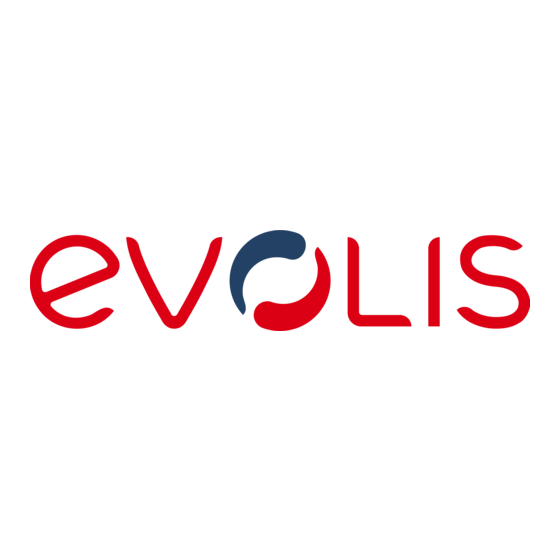

Evolis Quantum User Manual
Multifeature reversible encoder
Hide thumbs
Also See for Quantum:
- User manual (49 pages) ,
- User manual (57 pages) ,
- User manual (63 pages)
Subscribe to Our Youtube Channel
Summary of Contents for Evolis Quantum
- Page 1 User GUide MUltifeatUre reversible encoder integration of smart card encoders Evolis Card Printer © 2009. All rights reserved. October 2009. Item KU15E Rev A0...
-
Page 2: Table Of Contents
contents foreword ....................p.2 chapter 1 –... -
Page 3: Foreword
The encoding module has a motherboard with multiple connectors to link up to the contact and contactless smart card encoders. Such encoders can be placed in a dedicated area located behind the Quantum, and subsequently, be connected to the printer. -
Page 4: Chapter 2 - Features
Evolis. In compliance with the safety, quality, assembly and connections guidelines, users can customize the Quantum to their specific needs, when, for example, switching from a Mifare encoder to a device that manages HID Prox cards. -
Page 5: Chapter 3 - Using The Reversible Mode
The module can be replaced by the user with no tools needed, simply by following the instructions very carefully. Before doing anything else, please contact your Evolis dealer in order to check the advisability of replacing the encoding module. The dealer will supply a new encoding module if need be. - Page 6 to exchange the encoding module, please proceed as follows: Replacing the encoding module should only be done after turning the machine off and unplugging the mains power cable. Ê open the encoding module cover. Ë remove the encoding module found inside the machine. Ì...
-
Page 7: Chapter 4 - Connecting A Smart Card Encoder
Connecting an encoder to the electronic board requires advanced skills. A connector kit with cables and connectors is available from the Evolis product list. It is recommended that the use of any connectivity accessories, other than those provided by Evolis, is totally avoided in order to prevent damages (e.g. -
Page 8: Ä Overview Of The Connectors
overview of the connectors ä The connectors required for integrating an encoder are provided on the motherboard of the encoding module. The following figure (top view taken from the back) shows all available connectors, as well as their purpose and type. Each connector has a reference number, stated in the technical charts, to identify each and every cable terminal. -
Page 9: Ä Profile Of Connectors
profile of connectors ä The number « 1 » located next to the white circle identifies the marker for each connector. connectors with rows, you must pay attention the numbering of all pins! electrical and electronic items required for operating the ä... -
Page 10: Ä Power Supply
The choice between these two connectors is left to the technician. To avoid failures, check that the intensity during operation does not exceed the maximum intensity delivered by Quantum (see Consumption chart in Appendix 2). connecting the encoders to a port of the internal Usb hub ä... -
Page 11: Monitoring The Smart Contact Station
Monitoring the smart contact station ä (Items colored brown) Market feature comment J17-1: Smart C1 Vcc J17-2: Smart C2 RST J17-3: Smart C3 CLK J17-4: Smart C4 Reserved Type: HE10 – 2 x 5 J17-5: Smart C5 GND (Masse) OPTO+ and OPTO- : Signals the J17-6: Smart C6 Vpp presence of a card J17-7: Smart C7 I/O... - Page 12 - Use of an external smart card encoder. The encoder is plugged into the external DB9 (factory settings, if the printer is shipped without the encoder) This mode supports all Evolis products that come with a smart card encoder option (Pebble, Dualys, Securion) case 2 - Use of an internal smart card encoder.
-
Page 13: Monitoring The Contactless Smart Card Encoder (Rs232 Or Ttl)
Monitoring the contactless smart card encoder (rs232 or ttl) ä (Items colored blue) This chapter describes how to connect a contactless smart card encoder with an integrated or remote antenna. The antenna-connecting process varies according to the encoder profile and is therefore not addressed in the manual. - Page 14 A contactless smart card station can be connected in various ways. The most common ones are the following: case 1 - Use of an internal smart card encoder with a TTL interface that requires a TTL ä RS232 conversion. Output to the DB9 connector case 2 - Use of an internal smart card encoder that has a RS232 data interface.
-
Page 15: Appendix 1
appendix 1 a1-1 sMart card encoders connections – electrical charts rs232 & ttl ä... -
Page 16: Usb
ä power supply ä... -
Page 17: Ä Contact Station
contact station ä... -
Page 18: Appendix 2
appendix 2 a2-1 power sUpply and Usb-based power sUpply power supply for J24/J27 +24 V 500 mA max 650 mA max +3,3V 300 mA max power supply through Usb +3,3V_USB Not used +3,3V 300 mA max +VAUX Not used +VUSB1 Please refer the technical document of the PC- +VUSB2 powered USB...




Need help?
Do you have a question about the Quantum and is the answer not in the manual?
Questions and answers